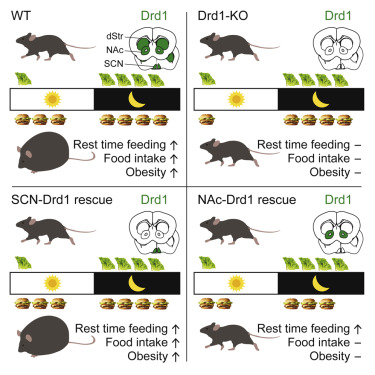当前位置:
X-MOL 学术
›
Curr. Biol.
›
论文详情
Our official English website, www.x-mol.net, welcomes your feedback! (Note: you will need to create a separate account there.)
Dopamine Signaling in the Suprachiasmatic Nucleus Enables Weight Gain Associated with Hedonic Feeding.
Current Biology ( IF 9.2 ) Pub Date : 2020-01-02 , DOI: 10.1016/j.cub.2019.11.029 Ryan M Grippo 1 , Qijun Tang 1 , Qi Zhang 1 , Sean R Chadwick 1 , Yingnan Gao 1 , Everett B Altherr 1 , Laura Sipe 2 , Aarti M Purohit 3 , Nidhi M Purohit 1 , Meghana D Sunkara 1 , Krystyna J Cios 1 , Michael Sidikpramana 4 , Anthony J Spano 1 , John N Campbell 1 , Andrew D Steele 4 , Jay Hirsh 1 , Christopher D Deppmann 5 , Martin Wu 1 , Michael M Scott 6 , Ali D Güler 5
Current Biology ( IF 9.2 ) Pub Date : 2020-01-02 , DOI: 10.1016/j.cub.2019.11.029 Ryan M Grippo 1 , Qijun Tang 1 , Qi Zhang 1 , Sean R Chadwick 1 , Yingnan Gao 1 , Everett B Altherr 1 , Laura Sipe 2 , Aarti M Purohit 3 , Nidhi M Purohit 1 , Meghana D Sunkara 1 , Krystyna J Cios 1 , Michael Sidikpramana 4 , Anthony J Spano 1 , John N Campbell 1 , Andrew D Steele 4 , Jay Hirsh 1 , Christopher D Deppmann 5 , Martin Wu 1 , Michael M Scott 6 , Ali D Güler 5
Affiliation

|
The widespread availability of energy-dense, rewarding foods is correlated with the increased incidence of obesity across the globe. Overeating during mealtimes and unscheduled snacking disrupts timed metabolic processes, which further contribute to weight gain. The neuronal mechanism by which the consumption of energy-dense food restructures the timing of feeding is poorly understood. Here, we demonstrate that dopaminergic signaling within the suprachiasmatic nucleus (SCN), the central circadian pacemaker, disrupts the timing of feeding, resulting in overconsumption of food. D1 dopamine receptor (Drd1)-null mice are resistant to diet-induced obesity, metabolic disease, and circadian disruption associated with energy-dense diets. Conversely, genetic rescue of Drd1 expression within the SCN restores diet-induced overconsumption, weight gain, and obesogenic symptoms. Access to rewarding food increases SCN dopamine turnover, and elevated Drd1-signaling decreases SCN neuronal activity, which we posit disinhibits downstream orexigenic responses. These findings define a connection between the reward and circadian pathways in the regulation of pathological calorie consumption.
中文翻译:

视交叉上核中的多巴胺信号传导使享乐主义喂养带来的体重增加。
高能量,有益食品的广泛供应与全球肥胖症发病率上升有关。进餐时间暴饮暴食和不定期的零食会破坏定时的新陈代谢过程,从而进一步增加体重。食用高能量食物来调整喂养时间的神经元机制知之甚少。在这里,我们证明了中央昼夜节律起搏器视交叉上核(SCN)内的多巴胺能信号传导干扰了进食的时间,导致食物的过度消费。D1多巴胺受体(Drd1)无效的小鼠对饮食诱发的肥胖,代谢性疾病以及与能量密集饮食相关的昼夜节律紊乱具有抵抗力。相反,遗传挽救SCN中Drd1的表达可恢复饮食引起的过度消费,体重增加,和致肥胖的症状。获得奖励性食物会增加SCN多巴胺的周转率,而Drd1信号的升高会降低SCN神经元的活性,我们认为这会抑制下游的致病性反应。这些发现定义了在病理性卡路里消耗调节中奖赏和昼夜节律途径之间的联系。
更新日期:2020-01-02
中文翻译:

视交叉上核中的多巴胺信号传导使享乐主义喂养带来的体重增加。
高能量,有益食品的广泛供应与全球肥胖症发病率上升有关。进餐时间暴饮暴食和不定期的零食会破坏定时的新陈代谢过程,从而进一步增加体重。食用高能量食物来调整喂养时间的神经元机制知之甚少。在这里,我们证明了中央昼夜节律起搏器视交叉上核(SCN)内的多巴胺能信号传导干扰了进食的时间,导致食物的过度消费。D1多巴胺受体(Drd1)无效的小鼠对饮食诱发的肥胖,代谢性疾病以及与能量密集饮食相关的昼夜节律紊乱具有抵抗力。相反,遗传挽救SCN中Drd1的表达可恢复饮食引起的过度消费,体重增加,和致肥胖的症状。获得奖励性食物会增加SCN多巴胺的周转率,而Drd1信号的升高会降低SCN神经元的活性,我们认为这会抑制下游的致病性反应。这些发现定义了在病理性卡路里消耗调节中奖赏和昼夜节律途径之间的联系。



























 京公网安备 11010802027423号
京公网安备 11010802027423号